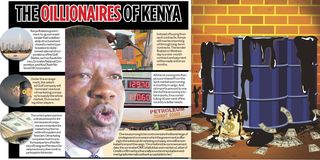Premium
Questions emerge over multibillion-shilling oil importation plan

What you need to know:
- On Wednesday, the government, for the first time since 2015, floated what it has christened “a government-to-government arrangement tender” that is deliberately structured and closed to restrict participation to state-owned national oil corporations of the Gulf States, such as Saudi Aramco, Emirates National Corporation and Abu Dhabi National Oil Corporation.
- What has changed? Here is a bit of background. Since 2015, Kenya has been buying petroleum under what is known as the “Open Tender System (OTS)” which is co-ordinated by the Ministry of Energy.
- The tender is floated every month with 112 licensed oil marketing companies participating.
The decision by the Ruto administration to change the system through which the country purchases oil dollar has been greeted with cynicism by the sector that suspects that it is a scheme to allow well-connected dealers to mint billions of shilling from the lucrative trade.
As we went to press, a group of 10 local oil marketers and traders were preparing to head to court to challenge the decision.
On Wednesday, the government, for the first time since 2015, floated what it has christened “a government-to-government arrangement tender” that is deliberately structured and closed to restrict participation to state-owned national oil corporations of the Gulf States, such as Saudi Aramco, Emirates National Corporation and Abu Dhabi National Oil Corporation.
What has changed? Here is a bit of background. Since 2015, Kenya has been buying petroleum under what is known as the “Open Tender System (OTS)” which is co-ordinated by the Ministry of Energy. The tender is floated every month with 112 licensed oil marketing companies participating.
Under the arrangement, the winner of the tender procures oil from refineries in the Gulf on behalf of all players and invoices local OMCs depending on market share – mainly the number of marketing outlets.
The arrangement is that once you get your allocation, you must go to the local market, look for dollars and settle within a week.
Dollar needs
Oil marketing companies must troop to the headquarters of the Ministry of Energy and Petroleum Development every other month to participate in this tender. Evidently, the system puts inordinate pressure on the market for dollars in the country because oil companies are constantly in the market to buy dollars to settle with suppliers and financiers.
The situation is compounded by the fact that all the oil coming into Kenya is purchased from the spot market and coming in monthly in cargo. And, oil imports amount to one-third of the economy’s total imports, thus constituting 30 per cent of the country’s dollar needs.
What has changed? How has the government-to-government tender floated on Wednesday changed the game? The idea behind the system being introduced is that, instead of buying from spot contracts, we will now be importing oil through long-term contracts. The tender floated on Wednesday is a nine-month contract and payment will be made within six months.
In this way, the country will manage the demand for dollars and therefore ease the foreign currency crunch Kenya has been grappling with for several months. Indeed, Kenya is currently in the middle of a major dollar liquidity crisis. Official reserves have fallen to precariously low levels and commercial banks have started limiting the dollars which a customer can withdraw. These restrictions by commercial banks have in turn fuelled worries and consequently precipitated a free-fall of the shilling.

Under Open Tender System, oil all dealers purchase fuel products from the winning bidder and retail it under Epra-regulated prices.
This is how, the CEO of the Energy and Petroleum Regulatory (Epra), Daniel Kiptoo, justified the new system introduced when The Weekly Review caught up with him this past Wednesday: “We are using the petroleum sector to resolve a macroeconomic problem. We can’t keep procrastinating because the shilling is continuing to slide.” He added: “Monetary policy alone will not give us the stability of the shilling that we need.”
Kiptoo explained that “under the current OTS system, settlement must happen in a matter of days once oil is delivered. The dollar needs of the petroleum sector is the biggest factor on the demand side”.
The Weekly Review: Have we abandoned the OTS system? Aren’t we just kicking the can down the road since the dollar situation will return after six months? Kiptoo: “We are just mothballing the OTS system until the problem of dollar shortages eases. We are buying time for the country’s official dollar reserves to improve.”
Clearly, Kiptoo’s arguments made perfect economic sense. But why are oil marketing companies murmuring and do the critics have a point? The point by the critics is that in the name of the noble objective of stabilising the exchange rate, the government has come up with an opaque arrangement likely to be exploited by greedy elites. As the saying goes, the devil is in the detail.
Proper scrutiny of the details of the tender document shows clearly that apart from the extension of the contract by six months, there is little in the new arrangement to show that it is indeed, “a government-to-government” arrangement, where Kenya has employed diplomacy in order to purchase oil from friendly Gulf states at a cheap price.
The tender document clearly shows under the subtitle ‘bidding prices’ that the price basis shall be the reference price known as Platt. Specifically, the tender documents say that the bidding price shall be “Platt Asia, Pacific Raba Gulf Markets PLUS freight and premium”. The implication of this is that there is no assurance that oil imported into the country under the so-called ‘government to government’ arrangement will be cheaper.
New deal
“Where is the value we are getting from this new deal?” posed a local dealer. He added. “Since every big OMC in this country is capable of doing what these Gulf corporations are being offered, why are we being left out?”
But perhaps the most controversial aspect of the conditions stipulated in the bid documents is the fact that the new arrangement will effectively lock out many players from the game.
Under the arrangement, the selected Gulf company will ‘nominate’ one local oil marketing company to supply the whole market, thus excluding other players. “If you are using the Platt price as the reference and only competing on freight”, why are we giving a foreign company the monopoly to supply us with oil for a whole nine months?
What is clear is that there will be billions of shillings to make from this arrangement. Contrary to popular belief, money from oil is not made at the pump but from negotiations and relationships with banks and refineries in the Gulf. This week, a prominent trader and regular winner of the OTS contract displayed to The Weekly Review documents and correspondence with a refinery from the gulf showing he had prices that were way below.
Another issue proving to be controversial are the liberal range of privileges and concession which the government is offering to the sole local oil marketing company, which will be nominated to import the cargo. The details are contained in a letter of comfort by the National Treasury that has been included in the bid documents. It says: “On or before the commencement date, the nominated OMC shall obtain and maintain a letter of Credit confirmed by a financially sound and reputable investment grade international bank acceptable to him.”
A source from the petroleum sector posed: “Why are they showing these fellows with privileges for a task that can be handled by a local oil marketing company or trader?”
The very short time given to bidders is also a subject of debate in the petroleum sector. The tender was advertised on Wednesday and closed on Friday. Already, rumours and unsubstantiated claims abound about a politically-connected oil imports dealer billed to win the lucrative multi-billion tender.





